19 start with K start with K
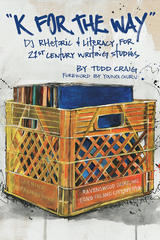
Using material from a larger qualitative research study that illustrates the Hip Hop DJ as a twenty-first-century new media reader, writer, and literary critic, Craig blends interviews from prominent and influential DJs in the Hip Hop community with narrative and interdisciplinary scholarship from writing studies, Hip Hop studies, African American studies, urban education, and ethnomusicology. The voices of DJs sit front and center, presenting a revolutionary conversation about writing and communication in the twenty-first century.
Weaving Craig’s life experiences with important discussions of racial literacies, “K for the Way” is a layered and utterly singular exploration of culture, identity, and literacy in America.
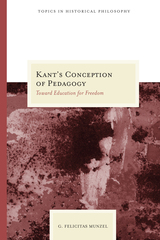
Although Kant was involved in the education debates of his time, it is widely held that in his mature philosophical writings he remained silent on the subject. In her groundbreaking Kant’s Conception of Pedagogy, G. Felicitas Munzel finds extant in Kant’s writings the so-called missing critical treatise on education. It appears in the Doctrines of Method with which he concludes each of his major works.
In it, Kant identifies the fundamental principles for the cultivation of reason’s judgment when it comes to cognition, beauty, nature, and the exercise of morality while subject to the passions and inclinations that characterize the human experience.
From her analysis, Munzel extrapolates principles for a cosmopolitan education that parallels the structure of Kant’s republican constitution for perpetual peace. With the formal principles in place, the argument concludes with a query of the material principles that would fulfill the formal conditions required for an education for freedom.
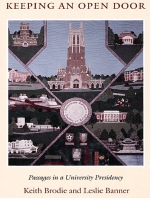
In Keeping an Open Door, Duke chancellor (1982-1985) and president (1985-1993) Keith Brodie and coauthor Leslie Banner recount what it was like to lead Duke during an era of change for research universities across the country: how Brodie reached some of his most controversial decisions, including the “Black Faculty Initiative”; his strategy for precluding abuse in Division I athletics at Duke; how his training as a psychiatrist shaped his leadership style and influenced how he dealt with trustees, deans, faculty, and students; and the avenues of power still open to today’s university presidents. The history and feeling of life on the Duke campus during the Brodie era are vividly evoked in photographs and key speeches introduced by the former president’s personal recollections.
Keeping an Open Door provides an insider’s view of issues critical to modern research universities and will interest anyone concerned with the history and future of higher education.
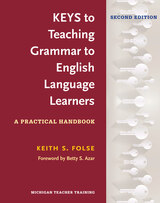
Keys to Teaching Grammar to English Language Learners: A Practical Handbook is not intended to be an exhaustive reference book about ESL grammar. Written for classroom teachers (K-12, ESL, EFL), this book teaches the most common ESL grammar points in an accessible way through real ESL errors together with suggested teaching techniques. Relevant grammar terminology is explained.
The four objectives of this book are to help teachers: (1) identify common ESL grammar points and understand the details associated with each one; (2) improve their ability to answer any grammar question on the spot (when on the “hot seat”); (3) anticipate common ESL errors by grammar point, by first language, and/or by proficiency level; and (4) develop more effective grammar/language learning lessons. These objectives are for all teachers, whether they are teaching grammar directly or indirectly in a variety of classes – including a grammar class, a writing class, a speaking class, an ESP class, or a K-12 class.
In the Second Edition, all chapters have been updated and substantively revised. The number of marginal (gray) boxes with tips and extra information has doubled. A 16th Key, on Negating, and three new appendixes have been added. One of the new appendixes provides a sample exercise from an actual ESL textbook plus relevant notes about the designing of grammar activities and suggestions for teaching each grammar point.
Also added to each Key is a section on the vocabulary items (e.g., collocations) that are related to the teaching of that particular grammar point. This information is unique to this edition and cannot be found elsewhere on the market.
The Workbook for the Second Edition (978-0-472-03679-0), available in 2017, includes numerous activities that practice the essentials of grammar and issues relevant to ESL teachers.
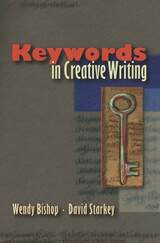
Wendy Bishop and David Starkey have created a remarkable resource volume for creative writing students and other writers just getting started. In two- to ten-page discussions, these authors introduce forty-one central concepts in the fields of creative writing and writing instruction, with discussions that are accessible yet grounded in scholarship and years of experience.
Keywords in Creative Writing provides a brief but comprehensive introduction to the field of creative writing through its landmark terms, exploring concerns as abstract as postmodernism and identity politics alongside very practical interests of beginning writers, like contests, agents, and royalties. This approach makes the book ideal for the college classroom as well as the writer’s bookshelf, and unique in the field, combining the pragmatic accessibility of popular writer’s handbooks, with a wider, more scholarly vision of theory and research.
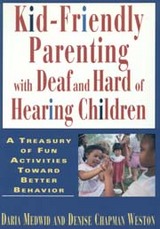
For the parents of thousands of deaf and hard of hearing children, this step-by-step guide offers hundreds of ideas and methods that work with children ages 3 to 12. It provides scores of play activities to help parents enhance communication, solve problems, and strengthen relationships in skillful, fun ways. Also, parenting techniques are concisely presented to help parents set limits while avoiding power struggles and help foster positive behavior changes. In addition, this manual provides information about special resources and support services.
At each chapter’s beginning, experts (some deaf, some hearing), including I. King Jordan, Jack Gannon, Merv Garretson, and others, offer their insights on the subject discussed. Designed for parents with various styles, Kid-Friendly Parenting is a complete, step-by-step guide and reference to raising a deaf or hard of hearing child.
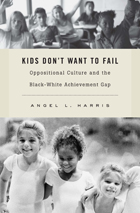
Understanding the causes of the racial achievement gap in American education—and then addressing it with effective programs—is one of the most urgent problems communities and educators face.
For many years, the most popular explanation for the achievement gap has been the “oppositional culture theory”: the idea that black students underperform in secondary schools because of a group culture that devalues learning and sees academic effort as “acting white.” Despite lack of evidence for this belief, classroom teachers accept it, with predictable self-fulfilling results. In a careful quantitative assessment of the oppositional culture hypothesis, Angel L. Harris tested its empirical implications systematically and broadened his analysis to include data from British schools. From every conceivable angle of examination, the oppositional culture theory fell flat.
Despite achieving less in school, black students value schooling more than their white counterparts do. Black kids perform badly in high school not because they don’t want to succeed but because they enter without the necessary skills. Harris finds that the achievement gap starts to open up in preadolescence—when cumulating socioeconomic and health disadvantages inhibit skills development and when students start to feel the impact of lowered teacher expectations.
Kids Don’t Want to Fail is must reading for teachers, academics, policy makers, and anyone interested in understanding the intersection of race and education.

You'll discover:
· how to implement writing as a part of daily life with family and friends;
· processes and invitations fit for young writers;
· strategies for connecting writing to math and coding;
· writing materials and technologies; and
· creative and practical writing ideas, from fiction, nonfiction, and videos to blogs and emails.
In order to connect writing to today's digital revolution, veteran educators Sharon A. Edwards, Robert W. Maloy, and Torrey Trust reveal how digital tools can inspire children to write, and a helpful companion website brings together a range of resources and technologies. This essential book offers enjoyment and inspiration to young writers!
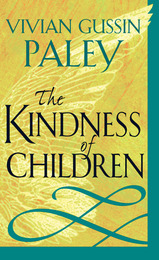
Visiting a London nursery school, Vivian Paley observes the schoolchildren's reception of another visitor, a handicapped boy named Teddy, who is strapped into a wheelchair, wearing a helmet, and barely able to speak. A predicament arises, and the children's response--simple and immediate--offers Paley the purest evidence of kindness she has ever seen.
In subsequent encounters, "the Teddy story" draws forth other tales of impulsive goodness from Paley's listeners. Just so, it resonates through this book as one story leads to another--taking surprising turns, intersecting with the narrative unfolding before us, and illuminating the moral meanings that children may be learning to create among themselves.
Paley's journey takes us into the different worlds of urban London, Chicago, Oakland, and New York City, and to a close-knit small town in Michigan's Upper Peninsula. Her own story connects those of children from nursery school to high school, and circles back to her elderly mother, whose experiences as a frightened immigrant girl, helped through a strange school and a new language by another child, reappear in the story of a young Mexican American girl. Thus the book quietly brings together the moral life of the very young and the very old. With her characteristic unpretentious charm, Paley lets her listeners and storytellers take us down unexpected paths, where the meeting of story and real life make us wonder: Are children wiser about the nature of kindness than we think they are?

In this book, David Shapiro and B. Oleko Tambashe trace the impact of these changes on the lives of women, and their findings add dramatically to the field's limited knowledge of African demographic trends. They find that fertility has declined significantly in Kinshasa since the 1970s, and that women's increasing access to secondary education has played a key role in this decline. Better access to education has also given women greater access to employment opportunities. And by examining the impact of such factors as economic well-being and household demographic composition on the schooling of children, Shapiro and Tambashe reveal how one generation's fertility affects the next generation's education.
This book will be a valuable guide for anyone who wants to understand the complex and ongoing social, demographic, economic, and developmental changes in contemporary sub-Saharan Africa.
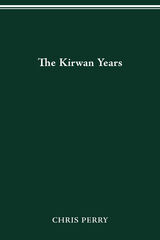
Enter President William “Brit” Kirwan, who understood this need perfectly and whose major legacy became widely known as the Academic Plan. This document became and remains the centerpiece of Ohio State’s agenda, with budget and other priorities emanating from its six strategies and 14 initiatives.
Continuing the Ohio State tradition of chronicling the university’s history through the work of its past presidents, The Kirwan Years recounts the Academic Plan’s creation, acceptance, and initial implementation, along with many major university accomplishments from mid-1998 through mid-2002. It also details the university’s ongoing, uphill struggle to maximize state financial support and its success in private and other fundraising. It provides a compelling look at the complexity permeating today’s research universities. And yes, it describes the firing of football coach John Cooper and the hiring of Jim Tressel.
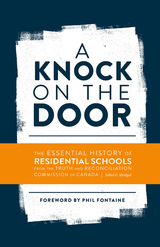
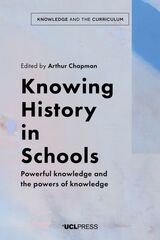
The “knowledge turn” in curriculum studies has drawn attention to the central role that the knowledge of the disciplines plays in education and the need for fresh perspectives on knowledge-building. Knowing History in Schools explores these issues in the context of the discipline of history through a dialogue between the eminent sociologist of curriculum Michael Young, and leading figures in history education research and practice from a range of traditions and contexts. Focusing on Young’s “powerful knowledge” theorization of the curriculum, and on his more recent articulations of the “powers” of knowledge, this dialogue explores the many complexities facing history education. The book attempts to clarify how educators can best conceptualize knowledge-building in history education, and it will be of interest to history education students, history teachers, teacher educators, and history curriculum designers, as they navigate the challenges that knowledge-building processes pose for learning history in schools.

Learning from children about citizenship status and how it shapes their schooling
There is a persistent assumption in the field of education that children are largely unaware of their immigration status and its implications. In Knowing Silence, Ariana Mangual Figueroa challenges this “myth of ignorance.” By listening carefully to both the speech and significant silences of six Latina students from mixed-immigration-status families, from elementary school into middle school and beyond, she reveals the complex ways young people understand and negotiate immigration status and its impact on their lives.
Providing these children with iPod Touches to record their own conversations, Mangual Figueroa observes when and how they choose to talk about citizenship at home, at school, and in public spaces. Analyzing family conversations about school forms, in-class writing assignments, encounters with the police, and applications for college, she demonstrates that children grapple with the realities of citizenship from an early age. Educators who underestimate children’s knowledge, Mangual Figueroa shows, can marginalize or misunderstand these students and their families.
Combining significant empirical findings with reflections on the ethical questions surrounding research and responsibility, Mangual Figueroa models new ways scholars might collaborate with educators, children, and families. With rigorous and innovative ethnographic methodologies, Knowing Silence makes audible the experiences of immigrant-origin students in their own terms, ultimately offering teachers and researchers a crucial framework for understanding citizenship in the contemporary classroom.
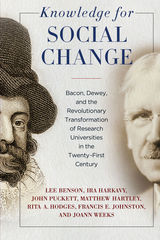
Employing history, social theory, and a detailed contemporary case study, Knowledge for Social Change argues for fundamentally reshaping research universities to function as democratic, civic, and community-engaged institutions dedicated to advancing learning and knowledge for social change. The authors focus on significant contributions to learning made by Francis Bacon, Benjamin Franklin, Seth Low, Jane Addams, William Rainey Harper, and John Dewey—as well as their own work at Penn’s Netter Center for Community Partnerships—to help create and sustain democratically-engaged colleges and universities for the public good.
Knowledge for Social Change highlights university-assisted community schools to effect a thoroughgoing change of research universities that will contribute to more democratic schools, communities, and societies. The authors also call on democratic-minded academics to create and sustain a global movement dedicated to advancing learning for the “relief of man’s estate”—an iconic phrase by Francis Bacon that emphasized the continued betterment of the human condition—and to realize Dewey’s vision of an organic “Great Community” composed of participatory, democratic, collaborative, and interdependent societies.
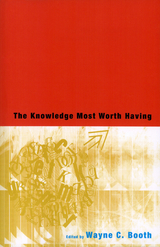
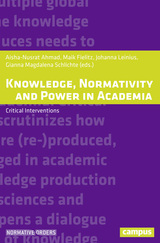
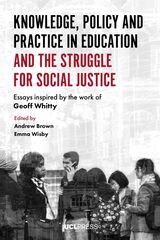
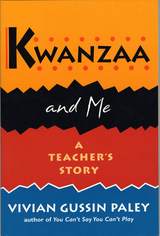
"All these white schools I've been sent to are racist," Sonya says. "I'd have done better in a black school. I was an outsider here." These are hard words for Vivian Paley, whose own kindergarten was one of Sonya's schools, the integrated classroom so lovingly and hopefully depicted by Paley in White Teacher. Confronted with the grown-up Sonya, now on her way to a black college, and with a chorus of voices questioning the fairness and effectiveness of integrated education, Paley sets out to discover the truth about the multicultural classroom from those who participate in it. This is an odyssey undertaken on the wings of conversation and storytelling in which every voice adds new meaning to the idea of belonging, really belonging, to a school culture. Here are black teachers and minority parents, immigrant families, a Native American educator, and the children themselves, whose stories mingle with the author's to create a candid picture of the successes and failures of the integrated classroom. As Paley travels the country listening to these stories, we see what lies behind recent moves toward self-segregation: an ongoing frustration with racism as well as an abiding need for a nurturing community. And yet, among these diverse voices, we hear again and again the shared dream of a classroom where no family heritage is obscured and every child's story enriches the life of the schoolhouse.
"It's all about dialogue, isn't it?" asks Lorraine, a black third-grade teacher whose story becomes a central motif. And indeed, it is the dialogue that prevails in this warmly provocative and deeply engaging book, as parents and teachers learn how they must talk to each other, and to their children, if every child is to secure a sense of self in the schoolroom, no matter what the predominant ethnic background. Vivian Paley offers these discoveries to readers as a starting point for their own journeys toward community and kinship in today's schools and tomorrow's culture.
READERS
Browse our collection.
PUBLISHERS
See BiblioVault's publisher services.
STUDENT SERVICES
Files for college accessibility offices.
UChicago Accessibility Resources
home | accessibility | search | about | contact us
BiblioVault ® 2001 - 2024
The University of Chicago Press









